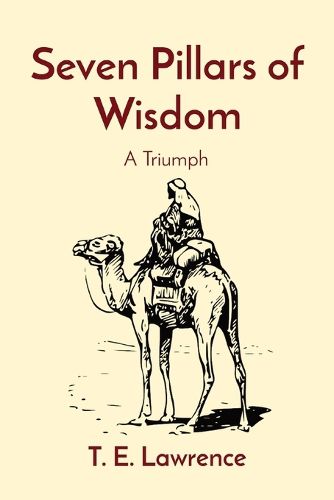Readings Newsletter
Become a Readings Member to make your shopping experience even easier.
Sign in or sign up for free!
You’re not far away from qualifying for FREE standard shipping within Australia
You’ve qualified for FREE standard shipping within Australia
The cart is loading…






This title is printed to order. This book may have been self-published. If so, we cannot guarantee the quality of the content. In the main most books will have gone through the editing process however some may not. We therefore suggest that you be aware of this before ordering this book. If in doubt check either the author or publisher’s details as we are unable to accept any returns unless they are faulty. Please contact us if you have any questions.
"Seven Pillars of Wisdom: A Triumph" is a memoir written by T. E. Lawrence, also known as Lawrence of Arabia. The book recounts Lawrence's experiences during the Arab Revolt against the Ottoman Empire during World War I. Lawrence played a key role in organizing and leading Arab forces against the Ottoman Turks in the Arabian Peninsula.
The title "Seven Pillars of Wisdom" refers to the seven great cities of the Arab world mentioned in the Book of Proverbs in the Bible. The book is not only a historical account of the events but also a literary work, known for its vivid and poetic prose. Lawrence wrote much of the book while recovering from injuries sustained during the war.
The memoir covers Lawrence's personal reflections, the challenges faced during the Arab Revolt, and his interactions with various Arab leaders. Lawrence explores the complexities of Arab politics, tribal dynamics, and the difficulties of achieving a unified Arab front against the Ottoman Empire. The narrative also delves into Lawrence's internal struggles with his identity, loyalty, and the moral implications of war.
"Seven Pillars of Wisdom" was initially published privately in 1926 and later in a more widely distributed edition in 1935. Lawrence's work has had a significant impact on the understanding of the Arab Revolt and the geopolitics of the Middle East during and after World War I. The book remains a classic in the genre of military memoirs and has been praised for its literary qualities and its contribution to the understanding of the Arab world.
$9.00 standard shipping within Australia
FREE standard shipping within Australia for orders over $100.00
Express & International shipping calculated at checkout
This title is printed to order. This book may have been self-published. If so, we cannot guarantee the quality of the content. In the main most books will have gone through the editing process however some may not. We therefore suggest that you be aware of this before ordering this book. If in doubt check either the author or publisher’s details as we are unable to accept any returns unless they are faulty. Please contact us if you have any questions.
"Seven Pillars of Wisdom: A Triumph" is a memoir written by T. E. Lawrence, also known as Lawrence of Arabia. The book recounts Lawrence's experiences during the Arab Revolt against the Ottoman Empire during World War I. Lawrence played a key role in organizing and leading Arab forces against the Ottoman Turks in the Arabian Peninsula.
The title "Seven Pillars of Wisdom" refers to the seven great cities of the Arab world mentioned in the Book of Proverbs in the Bible. The book is not only a historical account of the events but also a literary work, known for its vivid and poetic prose. Lawrence wrote much of the book while recovering from injuries sustained during the war.
The memoir covers Lawrence's personal reflections, the challenges faced during the Arab Revolt, and his interactions with various Arab leaders. Lawrence explores the complexities of Arab politics, tribal dynamics, and the difficulties of achieving a unified Arab front against the Ottoman Empire. The narrative also delves into Lawrence's internal struggles with his identity, loyalty, and the moral implications of war.
"Seven Pillars of Wisdom" was initially published privately in 1926 and later in a more widely distributed edition in 1935. Lawrence's work has had a significant impact on the understanding of the Arab Revolt and the geopolitics of the Middle East during and after World War I. The book remains a classic in the genre of military memoirs and has been praised for its literary qualities and its contribution to the understanding of the Arab world.